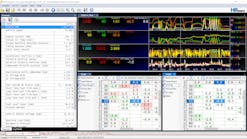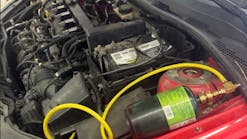A look at what it takes to be an automotive tech support specialist
Let’s not get started on the wrong foot here. I’m NOT a professional automotive technical support specialist. However, I do spend a lot of my time assisting others online by providing insight and technical support. Does this make me qualified? Perhaps not, but I’m going to give you my two cents anyway.
This article intends to pay respect and recognition to the men and women who have the title of Tech Support Specialist. These people sure have taught me a lot about:
- Developing my own diagnostic game plan;
- Thinking outside the box and not relying on flow charts to pursue faults blindly;
- How to access the necessary information to properly and efficiently diagnose a fault;
- Deductive reasoning; and
- Avoiding pitfalls and wasted time performing unnecessary tests
Playing puppet master
I’ve saved what I consider to be the most admirable trait for last — and that is playing the role of puppet master. This is not to be taken lightly, as the tech support specialist not only has a tremendous responsibility in front of them, he/she also has a reputation to uphold — for both themselves and the company they represent. It’s the clients (the shops/techs) that are counting on the tech support specialist to make logical decisions and guide them towards a diagnosis/proper fix.
Now, we’ve all had our butts kicked by that one vehicle that ruined our day or perhaps even kept us from sleep that evening. Heck, I know of technicians who have thrown in the towel and quit their job over a tough-to-solve issue! As ridiculous as that sounds, it’s the truth.
I told you that so you can consider this: that “one car” may have ruined your day and you were happy to get out from beneath it, I’m sure. Consider the average day for the technical support specialist. They aren’t faced with one tough-to-solve issue. They face sometimes dozens in a single day. They typically don’t specialize in one make/model/system or area of a vehicle. They are faced with many years/makes/models. I’m talking about European makes, domestics and Asians. I’m speaking about gasoline-powered, diesel-powered, electric/hybrid powertrains. Everything from drivability to HVAC to even ADAS. They have to be prepared for everything.
But there is one more layer of complexity and that is the fact that they have to offer their input from sometimes thousands of miles away. Not only do they have to have a solid understanding of the subject vehicle’s systems and individual components, but they have to trust that the technician on the other end of the puppet strings is performing the prescribed tests properly. This is almost always the biggest hurdle for the technical support specialist.
The one and only Chris Martino of OPUS IVS
This is where I have to give recognition to a dear friend of mine and one of the most intelligent technicians (and tech support specialists) I know. My great friend Chris Martino.
I love getting together with Chris because I always learn a lot from him. As mentioned above, his skillset is constantly being refined and polished. It has to be because he doesn’t use his hands as all of us technicians out there do. He is forced to use only his brain (the best tool in our arsenal) and relies on the technicians he is assisting to be his hands.
I commonly reference the puppet strings because of what I just stated above. But it’s the fact that it’s only human nature to be inherently lazy and take the path of least resistance. Chris is always aware of this and because of this awareness, he chooses his words carefully. For instance, it’s quite rare for Chris to ask yes/no questions. It’s simply too easy for the technician calling for help to answer just to fill a void. Sometimes Chris will require the technician to provide some information (test results) that may not be so quick or easy to obtain. An example of this might be Chris asking the technician about the integrity of a groundside of the circuit, particularly if there is any excessive voltage-drop present. Chris will not ask the technician if the grounds were tested. Most often that would lead to a response of “Yes, the grounds are fine.” It’s blemished responses like this that are frequently where the fault would’ve been discovered. Instead, Chris will ask the technician what the quantity of the voltage-drop was/how the test equipment was set up, and wherein the circuit the test was conducted. THAT is how to get the information needed for proper analysis!
Cool tools
To assist tech support specialists like Chris, they use some nifty tools to make their process even more efficient and accurate. For instance, many of the PC-based scan tools will connect to the internet via WiFi. This enables Chris to view the desired data PIDs and even set up certain tests he’d like to see the results of. Even the PC-based lab scopes support this type of connectivity. This makes for some very efficient analyses, especially when assisting a novice. Chris can still get the test results he needs to see, even if the novice is unsure of how to operate the equipment or perform the test. There are times when a test result is required but simply can’t be obtained due to a lack of tooling. Chris has been known to mail out his lab scope and pressure transducer on “loan.” What a CHAMP!
I distinctly recall on one particular occasion Chris sharing with me the fact that he will connect with a client’s cell phone camera and view the situation LIVE! This gives Chris the distinct advantage of being thousands of miles away but still being at the vehicle, virtually. This might not seem all that important, but rather than just viewing component locations in service information, Chris can see the components himself. This comes in handy when directing a technician to “pull on this” and “tug on that” area of a wire harness. This makes for rapid discovery of broken wires or poor connector fitment issues. Some of these can be very hard to find. Chris can even record/perform a demonstration and allow the client to view it from their phone. All of this to get the vehicle analyzed, diagnosed and repaired properly and as efficiently as possible.
So, how can this help me?
Maybe I wasn’t successful in convincing you to become a technical support specialist. But, there is still a huge takeaway here. As I’ve stated, tech support specialists like Chris are faced with dozens of faulted vehicles a day. Chris has assisted more than 50 technicians in a single day. The only way to do that is to have a plan. Master the basics, like Ohm’s Law. No, don’t memorize the actual written laws, but understand the relationship between voltage, current flow and resistance. Do some late-night reading before bed and get comfortable with the theory and operation of inputs like these, as they are used in every year/make/model out there:
- Variable reluctance sensors (creating AC sin wave signals)
- Hall-Effect/Magneto-resistive element sensors (creating digital square-wave signals)
- Potentiometers/Pressure sensors (creating signals correlating to position/pressure)
Get familiar with Outputs, too. These are all devices that follow principles of electromagnetic-induction and again…you will find them on every year/make/model out there:
- DC motors
- Solenoids
- Relays
- Ignition coils
These are the fundamentals that the tech support specialist has mastered, which makes them so good at their job, and such an asset to shops/technicians in a jam. You may not desire to be a tech support specialist, but you should mimic their habits. You will certainly take your diagnostic ability to the next level and may have yourself reaching for a Super Man cape!



